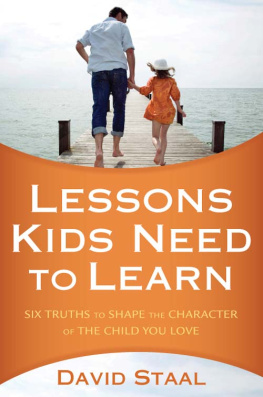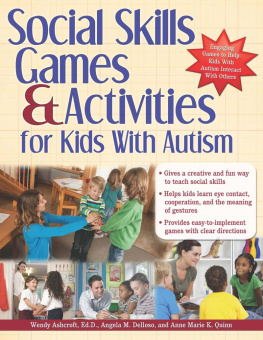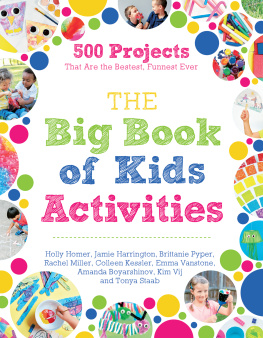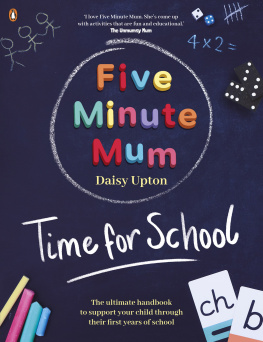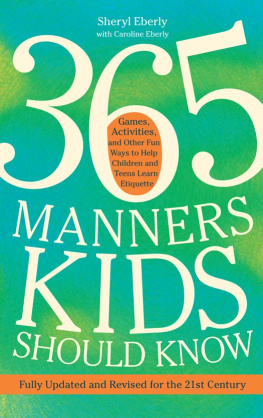M y son Ryan was 3,000 miles from home and didnt know anyone. Unlike many of his good friends who had chosen to go to college close to home in California, he had decided to go to the University of Virginia. I had gone with him and had spent a couple of days getting him settled in his apartment, but as the hour for me to leave for the airport arrived, we were both feeling the loneliness of his new surroundings.
I tried to keep my composure by giving him last-minute instructions and advice about doing laundry, grocery shopping, and other mundane aspects of life on his own. Then, just five minutes before I had to drive away, he asked me to quickly show him how to sew a button on a shirt. So through tears now visibly running down my cheeks, I tried to thread a needle and demonstrate the task for him, with tears now running down his face also. In retrospect, it was a very funny scene, but the experience made me wonder, during my long return flight, what other things I hadnt taught him in his 18 years at home.
I suppose all parents have similar nagging feelings when their children leave the nest. But the questions that tug most at your heart arent the ones about whether you taught your child how to sew on a button or change a tire on his car or the sheets on his bed. They are more likely to be questions like Did I teach him his manners and how to be respectful of others? Did I let him know how extraordinary he is and treat him with the respect that builds self-confidence? Did I teach her how to set goals and set priorities, and to persevere until those goals are realized? Did I teach her how to deal with disappointment and loneliness? Did I teach him that he can make a difference in the world? Did I teach him that getting along in the world is much more important than getting ahead? Did I teach her that the real joy in life comes from serving others? Did I do too much for her and not enough with her? Did I not say enough, or did I say too much and listen too little?
Most of us, when that time comes, wont be able to avoid the feelings that we somehow could have been better parentsthat we could have done more, could have been more effective, more loving, more perceptive, or could have been better examples to our children. But we will have more peace of mind if we know we have at least passed on to them a few of the most important things in lifethe values that will help them become successful, competent, caring, and ethical adults.
The desire of most parents is first and foremost to do what is best for their children. No one tries to be a bad parent; all parents want their kids to be happy. In fact, when parents make mistakes, its not usually because they dont care, but because they care so much.
One of the best ways to raise children who will end up being happy, productive adults is to give them a moral code by which to livea firm foundation of beliefs that will give them the inner guidance needed to make choices and face challenges in life. As the country song says, Youve Gotta Stand for Something, or Youll Fall for Anything. Children look to their parents to stand for somethingto set boundaries, establish rules of behavior, and point them in the right direction.
Who Should Teach Values?
Several years ago in Southern California, Tom and Pauline Nichter and their 11-year-old son, who were homeless and jobless at the time, found a wallet containing about $2,400 in cash, a credit card, and an airplane ticket. They immediately turned it in to the police, who were grateful but also surprised by the couples unhesitating explanation that they were just doing what we were brought up to dobeing honest.
As the media became aware of the situation, people around the country watching the news coverage were astounded at this extraordinary act of integrity. The owners of the wallet were found, but then an amazing thing happened. The Nichters started receiving letters-boxes and boxes of letters with donations of every size, job offers for both of them, and notes from complete strangers volunteering to help find housing for the family. People all over the country were so inspired by this familys honesty that they sent in a total of over $16,000 in donations. At one point, as Pauline Nichter stood in the midst of the bundles of letters coming in to the police station, she laughingly remarked, This is all my mothers fault.
This is all my mothers fault. In that one sentence, a whole lifetime of one mothers devotion, teaching, and example had been sufficiently rewarded. And at the same time, the morals which that mother had so profoundly instilled in her daughter, Pauline, were being passed down to yet another generation. Eleven-year-old Jason stood beaming before the cameras, holding his mothers hand, obviously proud of the parents he would always be able to look to for clarity in a world full of moral confusion.
Theres not much debate anymore about who should teach these important principles to our children. Schoolteachers are no longer allowed to teach them, or lack the time, energy, or parental support for such programs. Churches provide some very fine moral instruction, but dont reach enough people. The obvious answer is that values need to be taught by parents within the family setting.
There are many forces in the world today that pull against the family unit, but it is still the basic institution of society. The government may create organizations to take the familys place, our society may try in vain to create agencies to reform those who are delinquent, but nothing can replace the influence of the family. How much better it is to shape a human being from birth in a loving family than to try to reshape him later when his life has fallen apart because his family didnt care. As the child psychologist Dr. Kevin Steede has said, Its not a question of if youre going to parent, its a question of when. Pay the price now with your time and attention, or pay the price later for expensive rehabilitation.
There is no more important work in your life than the work youll do at home. It has been stated, If we all work on all the problems in our society and forget the fundamental unit of the family, it would be analogous to straightening deck chairs on the Titanic. It is in this laboratory of life, the laboratory of our homes, that we learn lifes most important lessons. It is with the people with whom we spend our days and our nights, our most intimate moments, our most difficult moments, that we have the potential of developing the most meaningful relationships. It is in our home school that our character is tested most and therefore can experience the greatest growth.
Most families are less than perfect; there is rivalry and contention, sometimes abuse and pain. Not all homes are conducive to warm, cozy evenings by the fireplace talking about trust or love. Some families wont feel comfortable doing some of the activities in this book together. But one way or another, we must teach this basic goodness to our children. Just as a great baseball player has to continually practice baseball, children have to be given the opportunities to practice goodness if they are to develop the habits of goodness. Perhaps for families who are really struggling, a parent can teach these principles one-on-one with his child in quiet moments. If we can take just a few minutes here and there to gently guide our children toward becoming selfless, respectful, resourceful, and compassionate people, then our home will be a school whose graduates will someday be depended upon by all of society.


